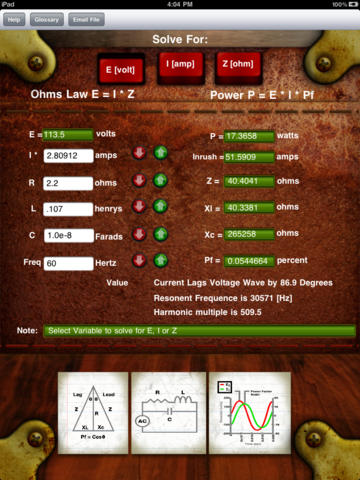
Ray Tools: AC Impedance Simulator app for iPhone and iPad
Developer: MEA Mobile
First release : 30 Nov 2011
App size: 10.24 Mb
Solving Ohms law for DC (E=I*R) is straight forward but what about AC. For AC (E=I*Z) looks simple but the value Z is composed of an inductor (a coil of wire) and a Capacitor. The AC frequency affects these calculations in a somewhat complex manner. This program makes calculating easy. Like my other program for just DC , select the value to solve for; either E, I or Z then the program takes over and calculates many other values such as Inductive reactance, Capacitive reactance, needed to calculate Z. A Glossary sheet helps you understand all variables. The inputs switch when you change the variables by just a little bit. Helps understand how the Equations work. All values change as you input values either by keyboard or UP/DN adjusters. Warns for division by zero and sets value to near zero. When your done just Email the results to your home base for review on any text editor or spreadsheet. This program is a must for Students and Engineers. It makes the complex understandable. Simply the best AC Ohms Calculator.
Features:
Ω AC Updates as You Edit
Ω AC Number Pad Digital Entry
Ω AC Division by Zero warning
Ω AC Solve for E, I or Z
Ω AC Circuit Diagrams
Ω AC Help and Glossary with equations, Email
Ω AC Calculates I, R Xl, Xc Power, inrush Current, Power Factor, Angle, Resonant Frequency and Harminic
Check Out Other RAY TOOLS Including:
- AC Impedance Simulator
- Output Driver Devices Simulator
- Inverting Operational Amplifier Simulator
- Non Inverting Operational Amplifier Simulator
- Sensor Input Devices Simulator
- AC Input Operational Amplifier Simulator
- 555 Timer
Search for RAY TOOLS on the App Store.
Example:
A home electrical system supplies current to an electric drill:
E = 113.5 [VAC] 60 [Hz] I = 2.80 [amps] R = 2.2 [ohms]
If you solve for I using the DC equation I = E/R you get I = 51.59 [amps]. What Gives? In an AC circuit I = E/Z. Z is composed of a resistor equal to 2.2 ohms and an inductive coil in the motor L [henrys’] and a capacitive component C [farads’]. The capacitive component is almost negligible and so leave it at 1 e-8 for now. Select “Solve for I. Input 113.5 [volts] for E and 2.2 [ohms] for R. Now increase the value of L [henrys’] until you get 2.2 [amps]. The result is .107 [henrys’] inductance. Problem solved. The capacitance can remain where it is unless changed for another problem. The value used 1.0 e-8 is probably good for most electrical systems unless you example has extra capacitance. Try solving for other variables using the adjuster buttons to see how the equations work. Check out the help, Glossary and Math sheets.
MEA Mobiles Ray Tools Apps are developed by Raymond Seymour. After working at General Electric for 37 years he’s now making Engineering apps for iOS. As an inventor he has over 60 granted US Patents.


